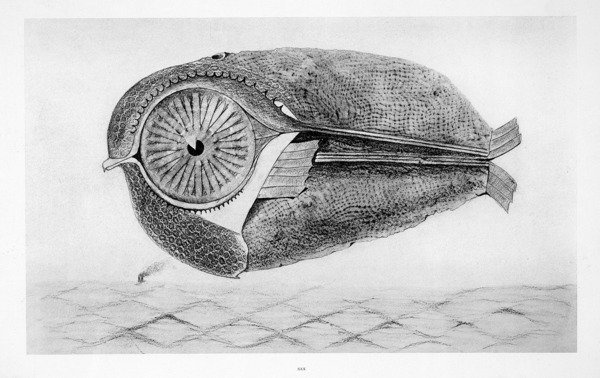Max Ernst
dal 24/3/2012 al 25/8/2012
Segnalato da
24/3/2012
Max Ernst
Kunstmuseum Bonn, Bonn
Clam tree, wooden bird and big-eyed fish. The exhibition's focus lies on the graphic series 'Histoire Naturelle', which Ernst reproduced photomechanically and published in 1926. The series consists of 34 frottages and shows the history of the origin of our earth by introducing us to a mysterious world of water, light, earth and air inhabited by unusual plants, fantastic animals as well as human beings.

curator Sabina Leßmann
In 1925, Max Ernst for the first time laid paper on the boards of a wooden floor and rubbed their surface structure onto it with the help of a pencil. The patterns and forms that thus became visible turned into independent and unique landscapes, objects and creatures that had to be found and, if necessary, highlighted with a pencil. This is how Max Ernst developed a technique called “frottage”, which he would often make use of later on and also adapt to oil painting.
The exhibition’s focus lies on the graphic series “Histoire Naturelle“ (“Natural History“), which Max Ernst reproduced photomechanically and published in 1926. The series consists of 34 frottages and shows the history of the origin of our earth by introducing us to a mysterious world of water, light, earth and air inhabited by unusual plants, fantastic animals as well as human beings.
In the museum’s exhibition space the animals in Max Ernst’s “Natural History“ meet stuffed birds and fish from the collection of the Museum Alexander Koenig, complemented by five bronze reliefs in the shape of different animals and human beings from the Max Ernst Museum Brühl des LVR. The exhibition space is hence transformed into a room full of nature, a laboratory for the eyes, and, above all, a workshop in which children and adolescents cannot only learn about the technique of the frottage, but also try it out themselves.
The exhibition will be accompanied by a Werkbuch with images and essays on Max Ernst as well as tips for experimenting at home.
In cooperation with the Max Ernst Museum Brühl des LVR
We would like to thank the Verein der Freunde des Kunstmuseum Bonn e.V. and the Zoologisches Forschungszentrum Alexander Koenig for their support.
Image: Max Ernst, l'évade (Der Ausbrecher), 1926. Aus der Serie Historie naturelle, Kunstmuseum Bonn
Press officer
Dr. Ute Herborg-Oberhäuser T. +49(0)228 77-6223 F -6206 ute.herborg-oberhaeuser@bonn.de
Sunday, 25th March Press conference h 11 a.m. and opening h 12 a.m.
Kunstmuseum Bonn
Museumsmeile Friedrich-Ebert-Allee 2 53113 Bonn
Hours
Tues – Sun 11 a.m. – 6 p.m.
Wed. 11 a.m. – 9 p.m.
closes on Easter Sunday, Easter Monday and 1 May



